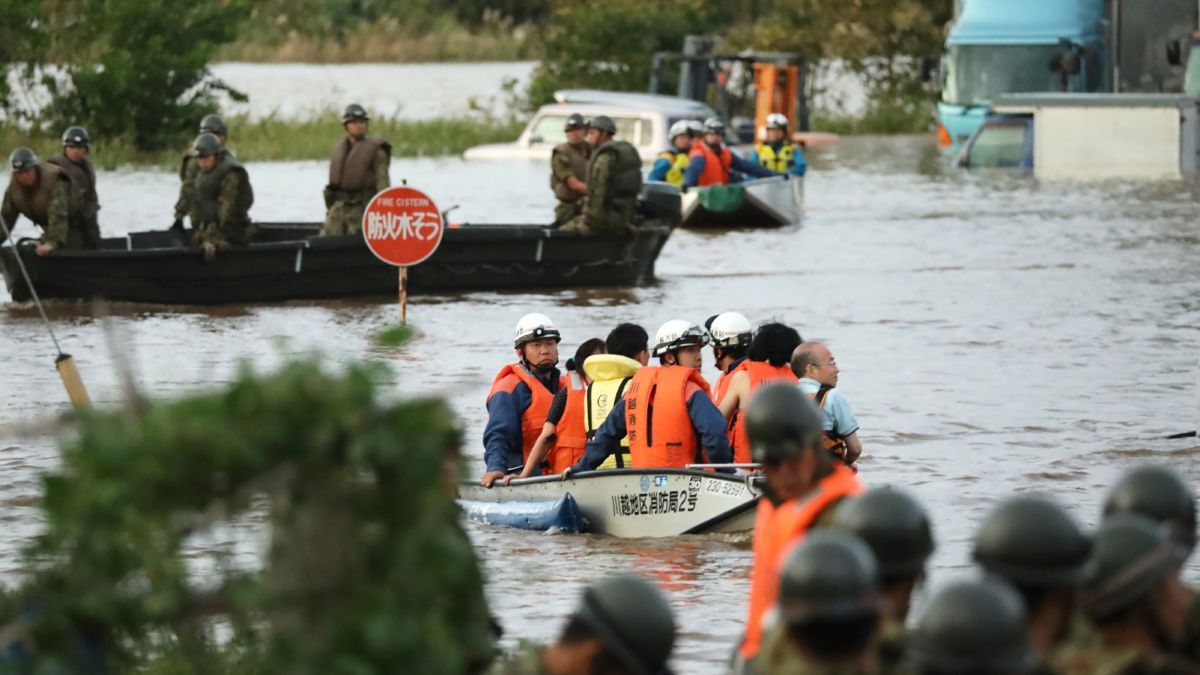Typhoon Hagibis kills over 70 and inflicts widespread damage in Japan

A few minutes every morning is all you need.
Stay up to date on the world's Headlines and Human Stories. It's fun, it's factual, it's fluff-free.
Typhoon Hagibis, the worst storm to hit Tokyo since 1958, made landfall southwest of the Japanese capital city around 7 p.m. local time on October 12. Wind gusts of up to 216 kilometers per hour (134 miles per hour) were reported in some parts of the country.
CNN reported that the typhoon brought “record-setting heavy rains and windstorms." The mountainous town of Hakone, southwest of Tokyo, received almost 1 meter (3.3 feet) of rain in 24 hours. Many other areas received as much as 40% of their average annual rainfall over the course of two days.
The Japanese Ministry of Land, Infrastructure, Transport, and Tourism told CNN that the heavy rain also caused 146 landslides sent 47 rivers spilling over their banks. Hagibis struck Japan just a month after Typhoon Faxai, which killed three people and injured dozens.
Japanese agencies offer initial Hagibis damage reports
Ahead of the storm’s arrival, more than 230,000 people were evacuated. Unfortunately, even with this precaution, Japanese public broadcaster NHK has reported 74 confirmed deaths nationwide as of October 16, with 10 others reported missing. Fukushima Prefecture, in the northeast of Honshu Island, suffered the highest casualty rate with at least 25 deaths.
The Japanese Fire and Disaster Management Agency said in a release that nearly 10,000 houses had been flooded across the country. The nation’s Cabinet Office estimated that 5,500 people are currently living in shelters as a result of the storm.
As of October 14, Industry Minister Isshu Sugawara said that 34,000 households are still without power; restoring electricity is expected to take more than a week in severely flooded areas. The Cabinet Office also reported that more than 133,000 households do not have water service.
[article_ad]
Economic impacts of the typhoon across Japan
Over the weekend of October 12-13, Hagibis caused widespread transportation disruptions. According to NHK, a third of bullet trains in Nagano were flooded or otherwise damaged, resulting in multiple train cancellations. Debris on tracks caused by flooding, wind and landslides delayed the restart of service on several lines.
East Japan Railway Company (JR East) said that it would take up to two weeks to fully resume operation, NHK reported. Meanwhile, at Japanese airports, over 1,600 flights were canceled.
Japan is currently hosting the Rugby World Cup and Formula One Grand Prix. Due to the typhoon, three Rugby World Cup matches and all Formula One events scheduled for Saturday, October 12 were canceled.
Officials have stated that it is too early to estimate the financial impact of Hagibis. However, insurance and reinsurance payouts associated with Typhoon Faxai, which hit the country in September, give some indication. Those payouts will likely total $5 billion to $9 billion, according to Risk Management Solutions.
Reinsurer Munich Re estimated that Japan suffered $34 billion in losses from natural disasters in 2018, including two typhoons, two earthquakes and multiple floods.
Search, rescue and recovery efforts fully underway
As of October 15, three days after the storm hit, search and rescue efforts were in full swing in affected areas. Cabinet Secretary Yoshihide Suga said that 110,000 firefighters, police officers and Japan Self-Defense Forces personnel had been deployed in the search for survivors. Rescue operations employed over 100 helicopters.
Prime Minister Abe said at a session of the Upper House Budget Committee that his government would designate Hagibis as a “severe natural disaster“, which will help affected regions to obtain government subsidies to begin reconstruction. He added that the government would draw on a 500 billion yen ($4.6 billion) special reserve to help the nation recover from the storm.
“It is urgent to provide adequate support for the victims," Abe said, according to a translation published in Japan Times. “There are concerns that the impact on life and economic activities will be prolonged," he added.
[article_ad]




Comments ()